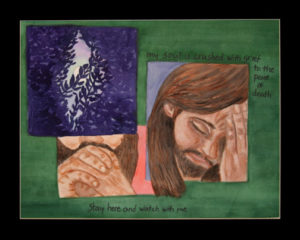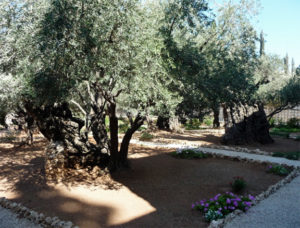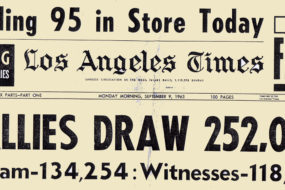March 29, 2017 • Life for Leaders
He came out and went, as was his custom, to the Mount of Olives; and the disciples followed him. When he reached the place, he said to them, “Pray that you may not come into the time of trial.” Then he withdrew from them about a stone’s throw, knelt down, and prayed, “Father, if you are willing, remove this cup from me; yet, not my will but yours be done.” [Then an angel from heaven appeared to him and gave him strength. In his anguish he prayed more earnestly, and his sweat became like great drops of blood falling down on the ground.] When he got up from prayer, he came to the disciples and found them sleeping because of grief, and he said to them, “Why are you sleeping? Get up and pray that you may not come into the time of trial.”
Luke 22:39-46

© Linda E.S. Roberts, 2007. For permission to use this picture, contact Mark D. Roberts.
Preface
Today, as we prepare for Holy Week and Easter, I’m beginning a 14-part series of devotions based on the biblical Stations of the Cross. You may be familiar with the traditional Stations of the Cross, which are common in Catholic churches and retreat centers. But you may not know that in 1991, Pope John Paul II published another set of stations, each of these based on biblical passages related to the Passion of Jesus. These biblical stations take us through the last day of Jesus’s life, allowing us to contemplate what he experienced and why it matters so much.
If you’d like to learn more about the Stations of the Cross, see the introduction to my devotional series on the Stations. Some of the devotions in this new series will be based on the former series, though adapted for the distinctive Life for Leaders context. Also, I should mention that my wife did the paintings for this series, at first for Irvine Presbyterian Church. In the last dozen years, we have made these paintings available through the Internet for churches at no charge. They have been used in hundreds of churches on six continents (not yet Antarctica), and have been permanently installed in at least one Catholic middle school). If you would like to use Linda’s paintings, please contact me at info@depree.org.
The First Station: Jesus on the Mount of Olives
In Luke’s telling of the story, Jesus went to the Mount of Olives to pray. Matthew and Mark add that Jesus prayed in the Garden of Gethsemane, which lies at the foot of the Mount of Olives. There, Jesus poured out his heart in prayer to his Heavenly Father, asking that the cup – which is to say, the cross to which he was heading – might be removed from him. Yet, Jesus freely submitted to the will of the Father, choosing the way of the cross, the way of suffering, the Via Dolorosa.

Photo courtesy of Mark D. Roberts. All rights reserved.
When I visited the Garden of Gethsemane several years ago, I was impressed with its simplicity and peacefulness. The calming beauty of the Garden seemed so disconnected from Jesus’s anguish there. It felt like a truly “holy” place, a place set apart from ordinary life, a place dedicated to God, a “thin place,” if you will, where the barrier between Heaven and Earth is almost non-existent.
Yet, as I think about the Garden of Gethsemane from where I sit today, I’m impressed that it was a place carefully tended by those who worked there (probably workers associated with the Church of All Nations next to the Garden). Yes, for pilgrims like me, it was a holy place, a place of inspiration and prayer. But it was also a workplace; a place where people raked leaves, planted flowers, trimmed trees, and gathered olives.
At first this seems like a strange paradox: a holy place that is also a workplace. We usually think of holiness and work as separate domains. Yet, Gethsemane reminds us that this separation isn’t necessarily so. What is for us a holy place, a place set apart, is for others a workplace, a place for labor.
In a deeper way, Gethsemane affirms this truth profoundly. What we see in the biblical account of Jesus is a truly human man. Yes, he is fully God, but also and evidently fully human. Jesus’s prayer in Gethsemane reminds us of his humanity. He didn’t live somehow “above it all.” Rather, the Holy One of God entered fully into human life and suffering, though without sin. He participated in real human activity, including work. As a matter of fact, the Holy One of God spent most of his adult life working as a craftsman. It’s likely that Jesus did this ordinary work for five or six times as many years as he devoted to his obviously messianic work. In his daily experience as the Holy One of God, he joined holiness to ordinary work.
Your workplace can be a holy place as well. After all, the Holy God is there. God is alive in you. God has invited you to share in his work in the world, whether you’re “tilling and keeping the garden” (see Gen 2:15), managing your employees, drafting legal documents, dressing young children, creating art, teaching students, or building tables. Your workplace may not be filled with quiet and beauty, like the Garden of Gethsemane. But, still, it is a place where you can meet, serve, and worship God.
QUESTIONS TO CONSIDER:
Do you ever think of your workplace as holy? Why or why not?
Have you ever sensed God’s presence as you worked? When? What did you make of this?
How might your work experience be different if you were to think of your workplace as holy?
PRAYER:
Gracious God, thank you for this time of year, in which we prepare for Holy Week and Easter. Thank you for the chance to focus on Jesus, especially on his last hours. As we use the biblical Stations of the Cross to guide us, help us to meet you, to know you more deeply, to love you more fully.
Thank you, dear Lord, for being present with us, even in our workplaces. May we learn to see you there, to attend to the still, small voice of your Spirit, to serve you in all we do. Be glorified today, we pray, as we work for you. Amen.
Explore more at the Theology of Work Project online commentary: The Passion (Luke 22:47-24:53)

Dr. Mark D. Roberts is a Senior Strategist for Fuller’s Max De Pree Center for Leadership, where he focuses on the spiritual development and thriving of leaders. He is the principal writer of the daily devotional, Life for Leaders, and the founder of the De Pree Center’s Flourishing in the Third Third of Life Initiative. Previously, Mark was the Executive Director of the De Pree Center, the lead pastor of a church in Southern California, and the Senior Director of Laity Lodge in Texas. He has written eight books, dozens of articles, and over 2,500 devotions that help people discover the difference God makes in their daily life and leadership. With a Ph.D. in New Testament from Harvard, Mark teaches at Fuller Seminary, most recently in his D.Min. cohort on “Faith, Work, Economics, and Vocation.” Mark is married to Linda, a marriage and family counselor, spiritual director, and executive coach. Their two grown children are educators on the high school and college level.




